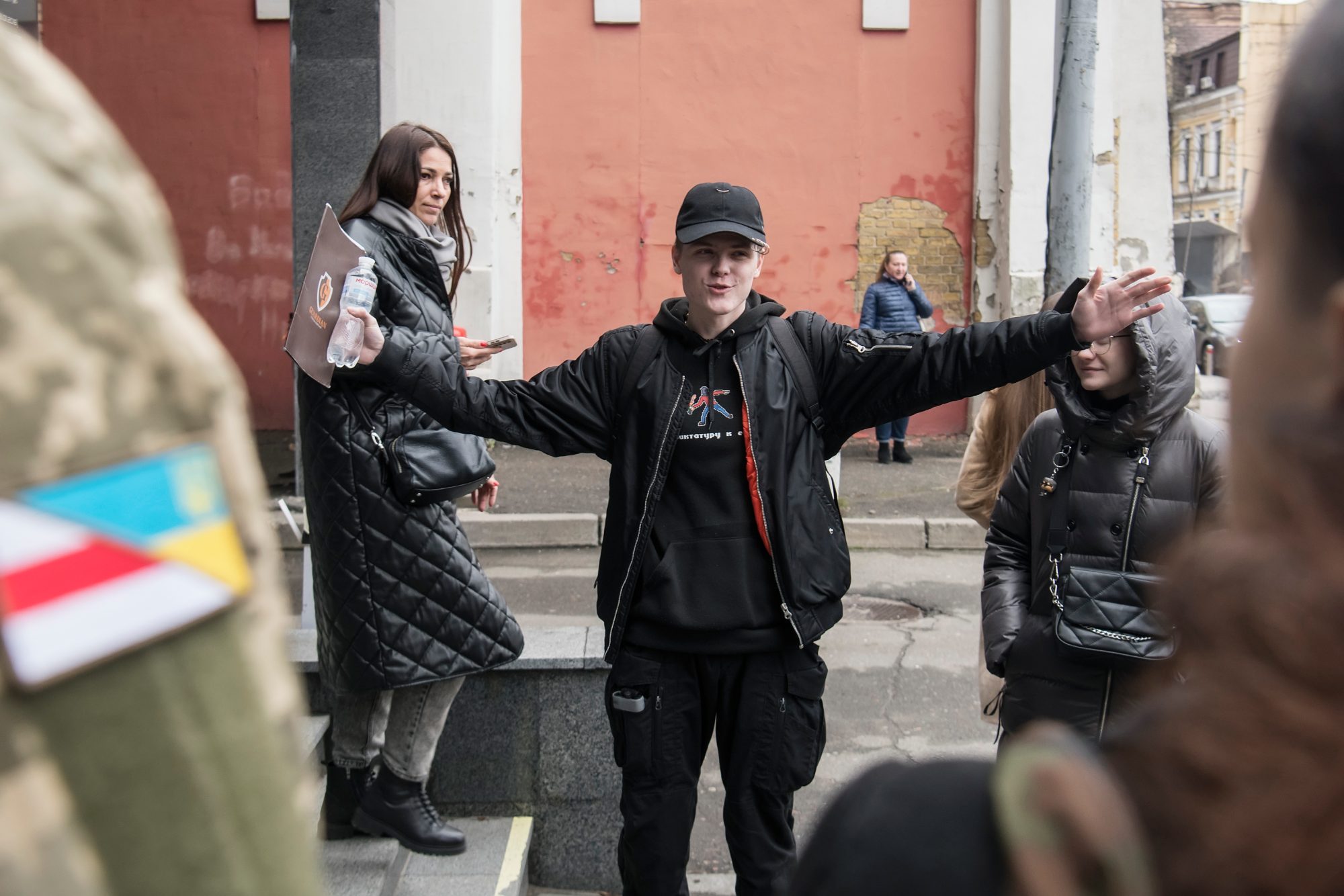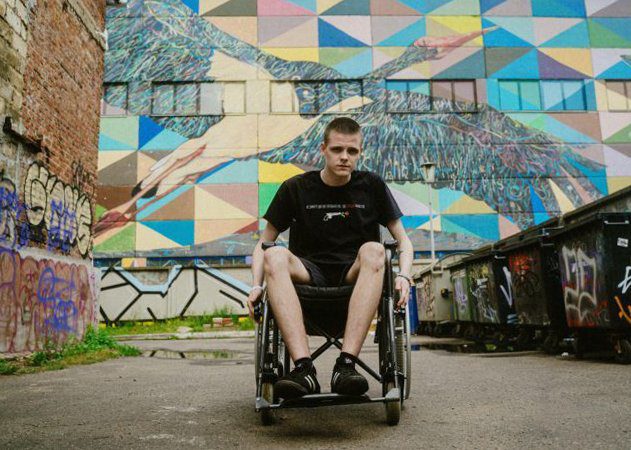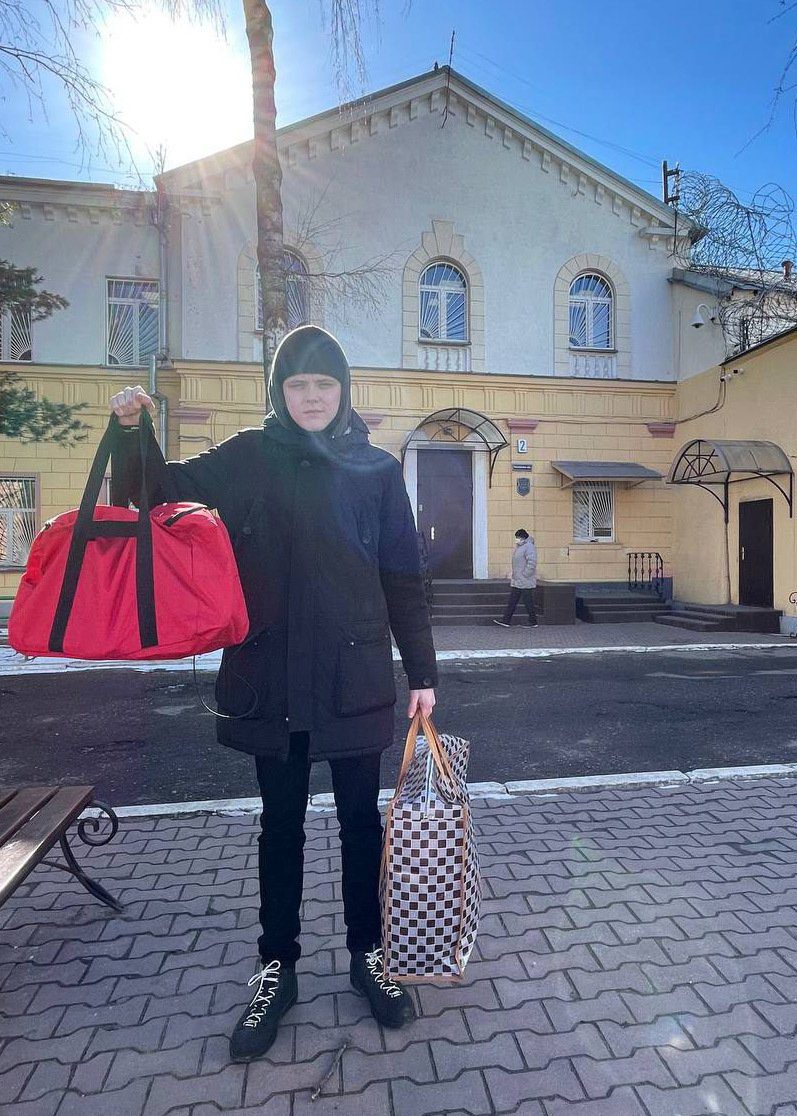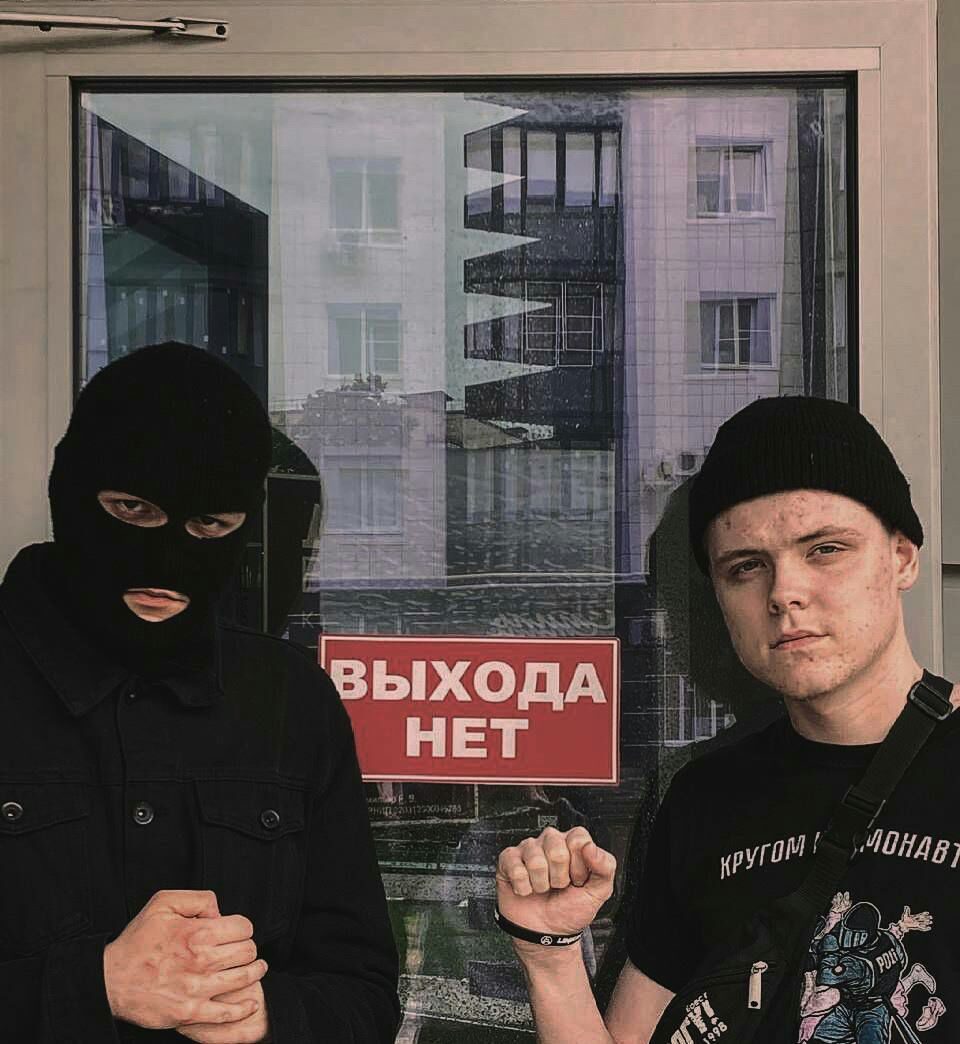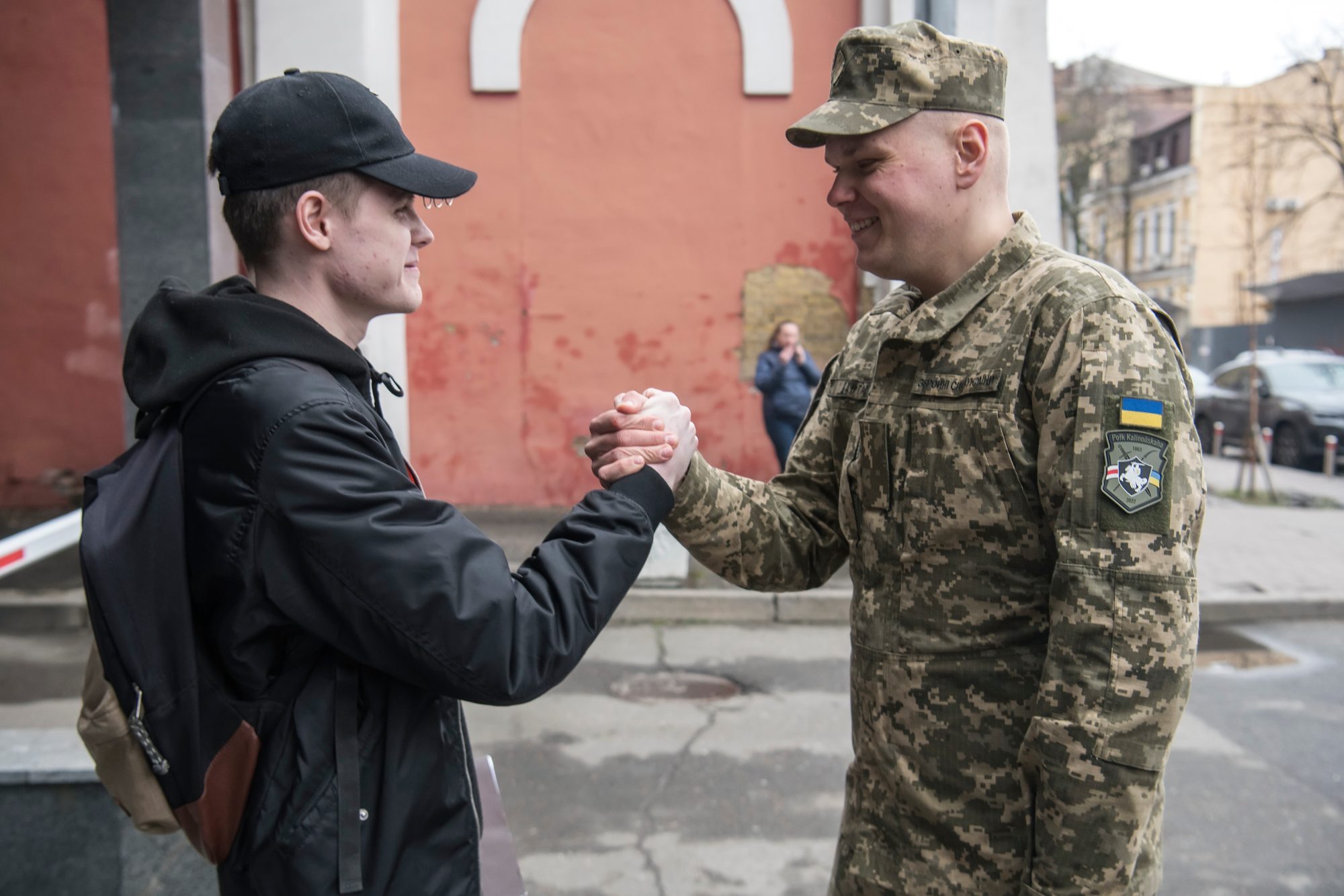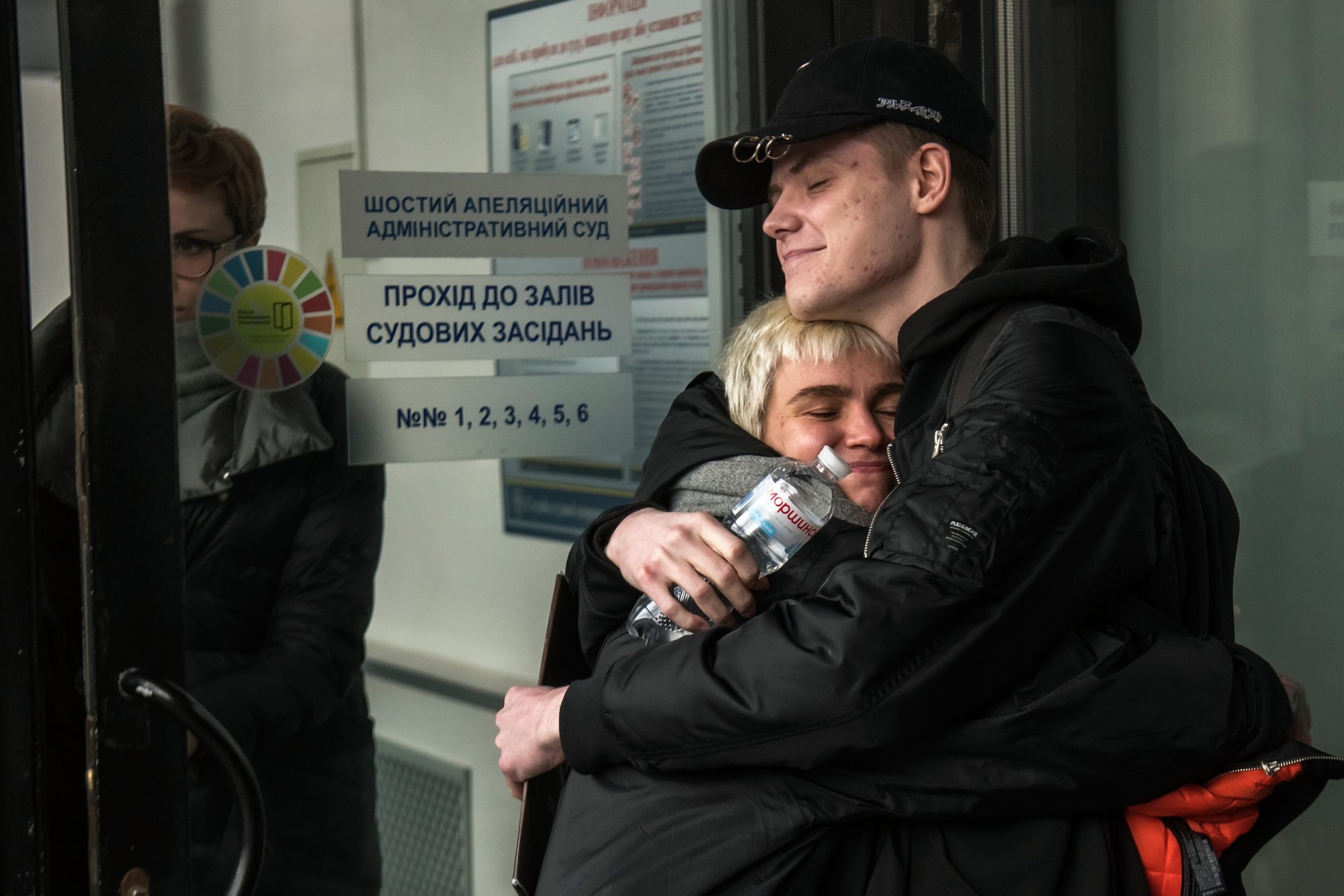“Prisoners Were Given an Attraction: They Had to Go Through the ‘Corridor of Death’.” The Story of a Belarusian Political Prisoner Who Chooses the Right to Stay in Ukraine
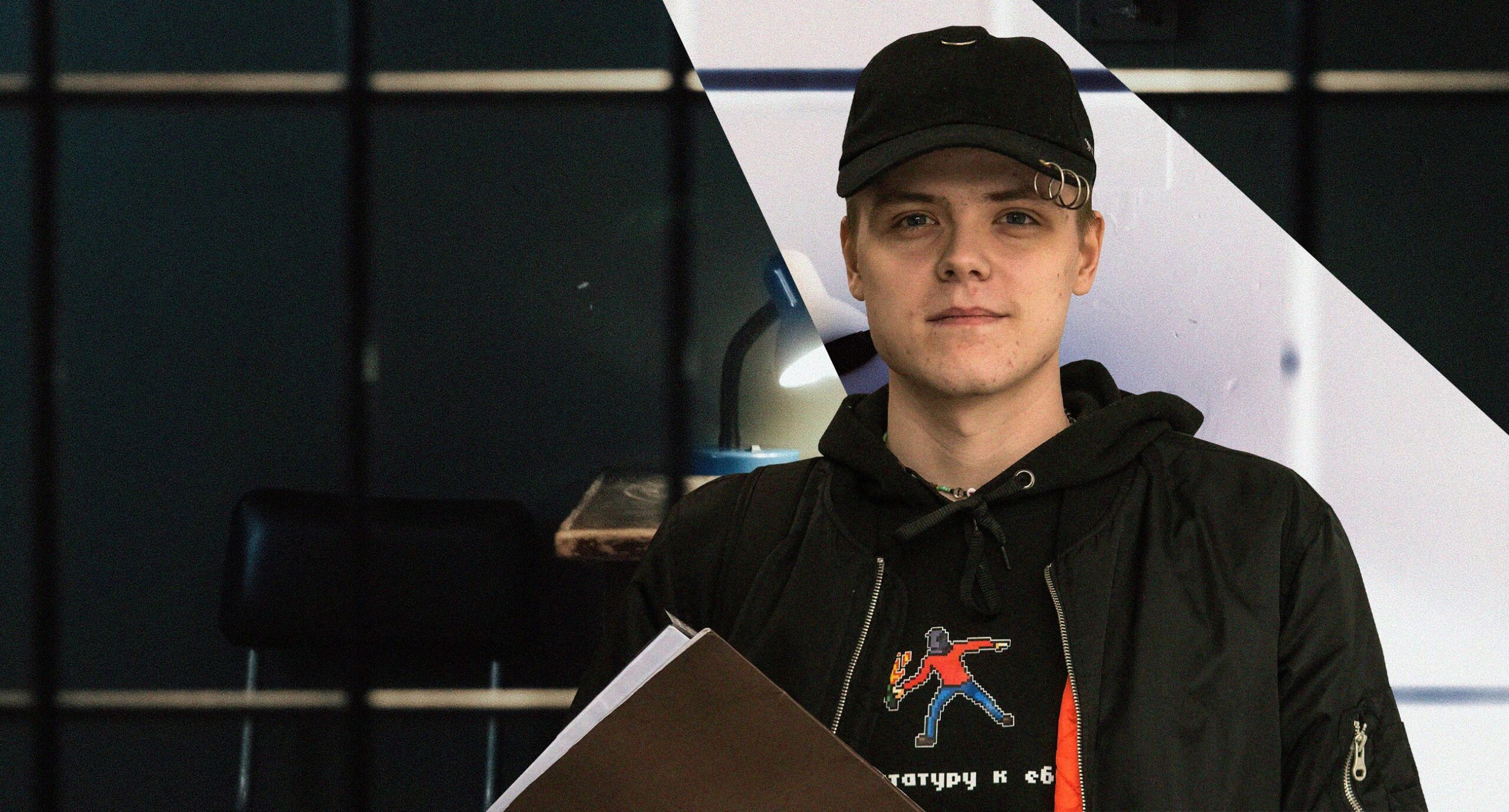
Belarusian activist Ivan Krasovsky was 18 years old when he was convicted for participating in mass protests against the regime of Alexander Lukashenko. During his detention, Krasovsky passed through the so-called corridor of death, ended up in a hospital, and hid from the special services in a Russian village until he got to Ukraine. Now Ivan is shooting a documentary about the war and is still fighting for his right to stay in Ukraine. Zaborona journalist Polina Vernygor recorded his story, which is similar to a political thriller — despite all the tragedy, it reads like an actual script.
Update: Ivan Krasovsky managed to win the case. On April 25, the Sixth Court of Appeal of Kyiv overturned the decision of the State Migration Service to deport a Belarusian political prisoner for the delay in obtaining a residence permit in Ukraine due to the war. Now he can apply for refugee status and legalize his stay in Ukraine.
Beware of people with handbags
Since I was a teenager, I was not satisfied with the political processes in my country — Belarus. I participated in the actions of the anarchist movement, supported political prisoners, and went to courts where their cases were considered. The police officers filmed me, identified me, then came to my house with searches, detained and accused me of extremism — at that time, until 2020, this was not a criminal, but an administrative punishment. However, it did not end there: they called me, threatened to open a criminal case against me, and threw me behind bars.
I was not afraid: I was motivated by some inner great goal — to fight for an independent Belarus. At one of the trials of the political prisoner Nikita Emelyanov, we were not allowed into the courtroom, so we stood in the corridor with the police. They provoked us into aggression in every possible way, but we only made fun of them. It turned out that among them was the head of the district office. In a couple of days, I found out that a case was opened against me for insulting a law enforcement officer. However, this case did not reach the court: I think it was a new intimidation stage.
On the eve of election day [summer 2020], mass detentions of activists began. Then they tried to come after me, but I turned off the SIM card, so it took work to track me down. As a result, I went to my mother’s in Zaslavl, Minsk region. From 6 a.m., police officers were already waiting for me — they were everywhere: under the entrance, at the polling station, and patrolling the district. They were dressed in civilian clothes but stood out very much among the locals: dark clothes, cheap shoes, boots, and handbags.
Zaslavl is a small town where everyone knows each other. At that time, many understood what the election results would be, that they would be falsified. People went to the polling stations to protest. And when they found out that I was being watched, they came to my entrance. Riot police arrived to disperse the protest.
I understood that I had to run away. In the evening, most law enforcement officers went to disperse the action in the city center, so there were fewer of them in my area. I jumped out of the window, got into my friend’s car, and drove to Minsk. On August 10 and 11, I went to rallies in the center. On August 12, I was detained by orientation at the station.
Akrestina
First, I got to the station support point. People from the State Department for Combating Crime and Corruption, an analog of the Soviet NKVD, a special structure for “political” people, came there. They tried to get into my phone. I didn’t let them do it because they would start beating me even harder if they saw my correspondence.
They started to torture. At first, they put it on a stretcher. Then I really wanted to go to the toilet, and they started hitting my bladder with purpose until I peed myself. They beat hard but very carefully — they wanted no apparent traces of beatings. Looking ahead: they failed miserably in this mission.
Then they decided to take me to the detention center in Akrestina. There were more than 15,000 people there; they beat everyone, the cells were overcrowded, and people were in the corridors. That’s how I imagined a modern concentration camp. Hell broke out there. I heard that I was asked to be placed separately and to “make a gesture,” but there were simply no free cells — I was lucky if you could call it that.
Before getting into the cell, I was tortured again: thrown on the floor and beaten. You couldn’t take your eyes off the floor: if you looked at those who beat, they hit even harder. Then one of the police officers said: “Let the dogs out.” I thought that I would die now if the dogs also bit me. But it turned out that this is what the police called the security forces.
I don’t know for sure who it was — riot police or Rosguards who came to Belarus at that time to quell the protests. I heard many voices with a characteristic accent, characteristic of the inhabitants of Chechnya or Dagestan. Those who did not have an Eastern accent had a pronounced Moscow accent, a certain peculiarity of pronunciation. Belarusians speak differently, somehow softer, more relaxed.

Photo: Ivan Ivanovych / Zaborona
“Long Live Belarus!” and “Glory to OMON”
There were many of them. I was beaten on the buttocks, head, and back. They forced me to shout, “Long live Belarus!”. At first, I didn’t scream because I understood this was an excuse to beat me even harder. Then I realized: silence did not help and began to shout. Some of them started demanding that I shout, “I love OMON.” I don’t remember exactly what I said then, but I decided to show off and whispered something like, “I don’t like regime dogs.” The blows fell on the back, ribs, stomach, arms, legs, groin, and head. Apparently, there was no place on my body where they didn’t beat me. I don’t know how long it lasted because I passed out at some point — they continued to kick my body, then brought me back to consciousness, threw me on the floor again, and beat me.
They arranged such an attraction for political prisoners: before entering the cell, the detainees had to pass through the “corridor of death.” It is a narrow corridor on the sides of which there are security forces. When the prisoner runs past them, they beat him in a group with batons, hands, and feet on one’s body.
I understood that it was necessary to run through this corridor very quickly and not stop for a moment to endure the pain so that it would simply end faster and they would not have time to “beat the hell out of you.”
At the end of the corridor, I was thrown to my knees. One of the security guards started recording a video on his phone. He again demanded that I shout, “Glory to OMON.” I did everything they wanted me to do because I wanted to lie down as soon as possible so that no one would beat me. They hit me again several times and threw me into the cell.
However, you can’t call it a cell. It is a courtyard for walking — a room measuring about 5 by 5 meters, with about 70 people. Not only was there nowhere to sit, there was nowhere to stand either: everyone huddled together like sparrows in a jar.
I began to faint; they put me on the ground, on the feet of other prisoners. There was almost no water. For such a number of people, the security forces brought two liters of water every four hours.
The prisoners demanded to call an ambulance for me. At first, the security forces were indifferent to the fact that I was lying unconscious. An hour later, almost everyone in Akrestina knew that I still hadn’t regained consciousness. A paramedic was allowed to see me, and he said that I needed to be taken to the hospital urgently.
By some miracle, my bones were almost intact — only a broken arm. My whole body was blue-black from hematomas, and I couldn’t walk. In a few days, I was discharged from the hospital, and for two weeks, I moved around in a wheelchair.
I immediately went to the protest from the hospital. I gave interviews to journalists, although the security forces threatened that if I told about the torture, they would take me to the forest, and no one would find my body. But just now, the government amnestied many people detained during the protests. There was an unspoken order not to touch but to wait.

Ivan Krasovsky. Photo courtesy of Ivan Krasovsky
“Chemistry”
On September 24, I started walking on my own. The police found out about it immediately and came to detain me for organizing mass protests. They almost didn’t beat me in the pre-trial detention center. Still, they put a lot of moral pressure on me: they threatened me, promised to take my best friend’s newborn baby away, and restricted my friend’s access to vital drugs, who developed epilepsy after being beaten by riot police. Interrogations could last up to six hours. They tried to get information about my friends and activists I know.
Before the New Year, the incriminating article was suddenly reduced to me. Instead of 8 years in the colony, I was threatened with up to three years of “chemistry” with a referral. Perhaps they expected that I would be very happy and say something unnecessary in the cell, where there is always, if not a spy, then an eavesdropper.
On February 18, I had a trial. They found me guilty, but I was sent home from the courtroom for 10 days — before the verdict came into force. I filed an appeal, so I had another month free while it was processed.
I was constantly being watched. I think they let me go home to keep track of who I would see — they wanted to expose someone. Or it was a kind of trade in political prisoners in exchange for the waiver of sanctions. There was a big risk that I would be slapped with a criminal article about violating the regime of detention on “chemistry.” Then I would not be considered a political prisoner in Europe.

Ivan Krasovsky after leaving the pretrial detention center. Photo courtesy of Ivan Krasovsky
(not) Get out of the ground
Anything could happen. Therefore, it was necessary to flee the country as quickly as possible — to travel illegally through Russia to Ukraine. There were no other options: the security forces were closely following other directions then.
I was not afraid of the Ukrainian border guards because I understood that I would come to the border, ask for political asylum, and definitely not be detained and handed over directly to the hands of the Belarusian special services. The situation with the Russians is entirely different.
I found a person who was ready to take me across the Russian border for $600. A van was supposed to pick me up from Belgorod. I bought a Russian SIM card to keep in touch with the people who were supposed to pick me up. There were no other options except to pay the bill with a Belarusian card. I understood that the new sim would immediately be connected to me and track the location through it. But I was sure they simply wouldn’t have time to get to me because I would already be at the border at night.
It turned out that I underestimated the special services. After a few hours, a car with law enforcement officers arrived at the hostel where I stayed. I saw them from the window and realized that it was after me. I ran out through the back door. I could not turn off the Russian SIM card because I was in contact with the person who organized my escape. I was told to run across the yards from the police until the driver picked me up.
Run, run, and don’t look back
It was already dark. No matter which yard I ran into, a police car would arrive there after a few minutes. I climbed into some crevices and parked cars; they drove past my hiding places. They could clearly see that I was in that radius because they tracked my sim in real-time.
He didn’t pick me up, and later the person who took the money for the evacuation stopped answering my calls. Now you could only count on yourself. I went to a crowded place to get lost in the crowd. I ran to the local university, where many students were walking. While pretending to be a student, I noticed a large forest across the road. I had to cross the square and the parking lot to get there, where the suspicious “Priora” stood with two stocky men inside.
I guessed who the men in the car were. But I thought I was fooling myself, and it was just two friends sitting in a car at night in a parking lot and sweetly discussing, let’s say, their wives and children. I called the girl so that in the event of an arrest, she would be the first to know about it and be able to convey everything to the media.
There was no other way out — it was necessary to go past the car. I thought that if these men got out of the car, I could quickly run into the forest and hide there. When I got to the parking lot, they noticed me and started opening the door. A company of 20 drunken young men was walking ahead. I approached them and kicked one of them in front of the onlookers. His friends started to rush at me, I hugged one of them and said in his ear that I work for Navalny’s fund and I am being “grazed” now, I need help. I didn’t know how they would react to the Belarusians, so I lied. I asked them to take me to a safer place so the guards would think I was just a student from the company of young people.
The guy reacted immediately, hugged me back, and told his friends I was okay. They brought me to this forest, I explained the situation and admitted that I was running away from the Belarusian security forces. The guys got angry, didn’t believe my story initially, and wanted to hand me over to the men in the car. I offered to Google my name, showed my passport, and everything fell into place.
It turned out that these guys lived in a small town on the border with Ukraine. In fact, there is nothing there except a shopping center and a 24-hour cyber club. Those guys worked in this club and went to Belgorod to study. By the time we arrived, I was still hoping they would pick me up and take me to the border. I did not turn off the SIM card.
But I was still waiting for someone to contact me either that day or the next. That’s how I finally understood that I was abandoned, and I stayed in this town for another two and a half months.

Ivan while hiding in Russia. Photo courtesy of Ivan Krasovsky
Cyber club
In the cyber club, there was a recess in the wall that could be covered with plywood. I lived there. One night, the same car that chased me in Belgorod came to the club. I hid in this hole. One of the passengers got out of the vehicle and entered the club. He went around all the halls, looked in every corner, and asked the administrator if anyone could come here to play “Dandy” at night. On “Dandy.” In the cyber club.
We recorded the video cameras and found this man based on his photo in Odnoklasnyky — it turned out that he works at the Ministry of Internal Affairs in the Department of Combating Extremism and posts many pictures in uniforms and vests.
It was necessary to deactivate the SIM card urgently. But it would be strange if I turned it off here — then all roads would lead the investigators to the cyber club. We decided to go to a nearby village with no mobile coverage and turn off the card there so that it looked like I was in that village.
The car with special officers continued to stand in front of the club. Another guy and I left through the back door and called a taxi. Lucky for the taxi driver: he immediately suspected something was wrong, so I had to tell him who I was briefly. The driver said he supported the Belarusians during the protests and quickly and discreetly took us to this village. I turned off the SIM card there and came back.
I lived under plywood in a cyber club for about a month, and then for another month and a half, I wandered around the apartments of students who protected me. My girlfriend, who had fled to Kyiv then, got to know the BYSOL organization, a foundation that helped evacuate those facing criminal charges for participating in protests. Through their channels, they helped me reach the Ukrainian border. So, on July 14, 2021, I got to Ukraine.

Photo: Ivan Ivanovych / Zaborona
Freedom
My girlfriend was already waiting for me in Ukraine. In theory, it would be good to go and apply for asylum at this moment immediately. Still, I just wanted to rest a little, sleep in a normal bed, eat delicious food, watch a movie with my girlfriend, and only then solve the issue of legalization. It was a fatal mistake.
During the week when I came to the migration service to submit documents, it just closed for another quarantine. I could have made it if I had left a few days earlier. They told me to come when the quarantine is over. They advised me to contact the Right to Protection organization, which, with the support of the UN, helps political refugees seeking asylum in Ukraine.
This organization helped me and my girlfriend collect the required documents package. But they were accepted by us only on October 6. According to the law, we had to issue a certificate of application for asylum and schedule an interview within 5 days. But we didn’t know about it, and the State Medical Center, apparently, decided not to follow this rule.
There was no news from the migration service for two months. My girlfriend called the Social Security Administration, but she heard only about new restrictions and the postponement of applications every time.
It continued until January when my girlfriend was called to the migration service. After the interview, they immediately gave a certificate of legal stay in Ukraine. She asked the inspectors when they would call me, and they told her not to worry — they would call me when the time came.
That’s how the month passed. My girlfriend has already gone through the steps to legalization, and I still haven’t received a call. I felt terrible: torture, pressure from special services, escapes, chases, and constant paranoia for almost a year could not pass without a trace. Doctors diagnosed “post-traumatic stress disorder” and suggested hospitalization in a psychiatric hospital. I felt I needed it.
Just during treatment, I finally got a call from the SMS. The nice man on the other end of the line listened to all about my situation and promised that I would have no problem if I came when I was discharged from the hospital.
War
When I got home from the hospital, my family called me. While I was being treated, my father died, and a criminal case was opened against my mother in Belarus. Everything was terrible again. I was worried and could not even get out of bed, let alone leave the apartment. I decided to give myself another week and then definitely go to the hospital.
But the morning of February 24 happened five days later. I felt crazy adrenaline and understood that if I was here, then I had to help something. I called the Belarusians living in Kyiv, and we got together in a few hours and came to a Belarusian bar to discuss the action plan. They decided to stay there because the bar was underground and to volunteer. About 150 of us were Belarusians, Ukrainians, and Kurds in the first weeks. We collected money and prepared food for the locals, helping Belarusian volunteers.
Everything worked on pure enthusiasm and adrenaline. I probably recovered only when the Russians were driven away from Kyiv. I went to the migration service. I was told that the employees had gone away and cannot consider my case now, and in general, they are working in closed mode — only on some urgent tasks.
They opened again only in autumn. During this time, I managed to go to the front with the foreign volunteer legion as a volunteer and start shooting a documentary film about the war in Ukraine. Actually, on October 17, I filmed the consequences of the attack of Russian drones on a residential building in Kyiv for the film. The law enforcement officers noticed me and came to ask for my documents. I didn’t have any documents because they didn’t give me a certificate from the State Security Service, and my passport was with the Belarusian special services.

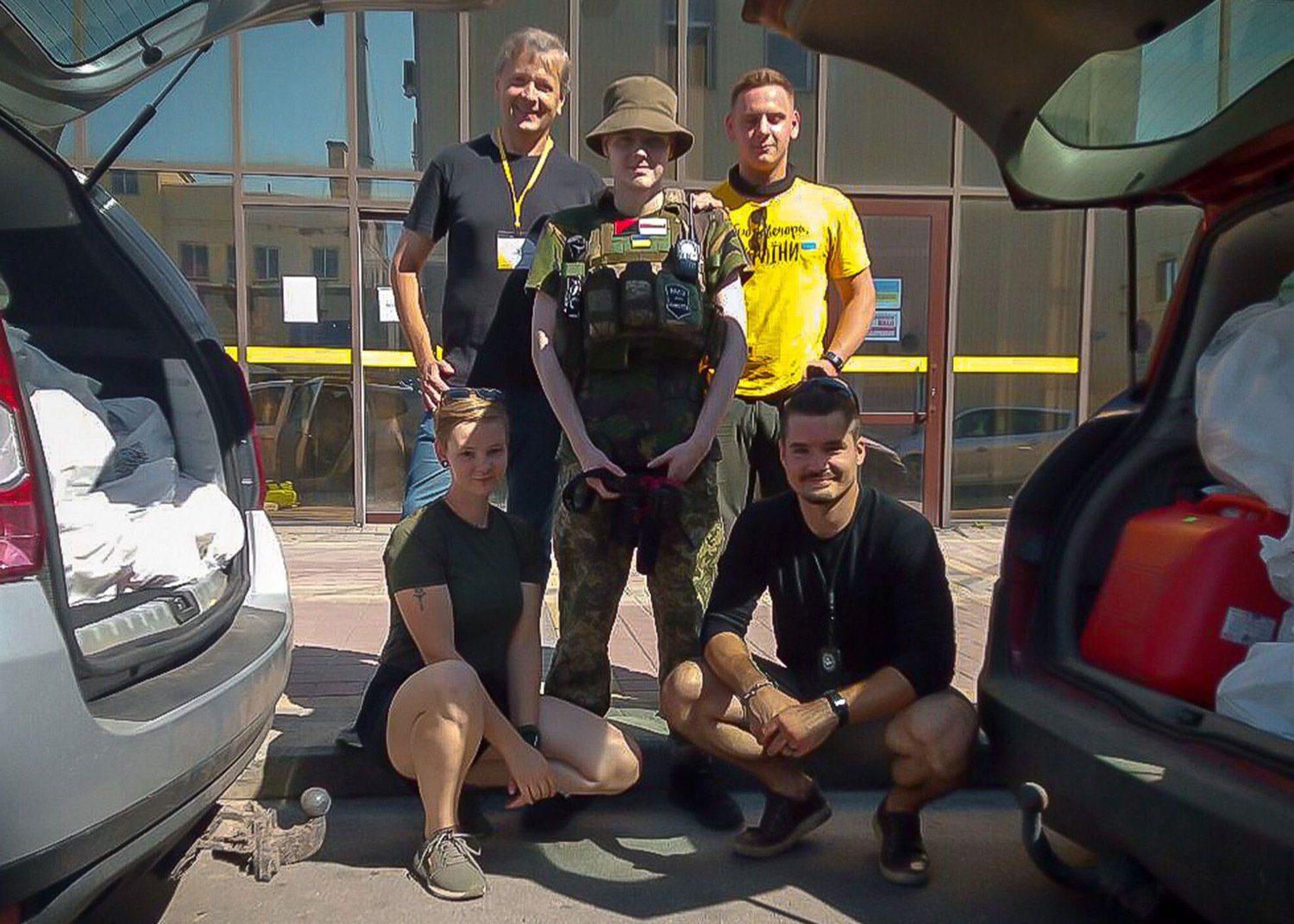
“What political prisoners are there in Belarus?”
I showed the UN protection certificate and tried to explain the situation. But they twisted me and took me to the Shevchenkovskiy district police department. They took my phone and demanded to unlock it to read the messages. Unlike the situation with the protests in Belarus, here, I had nothing to hide; I did everything I required.
I heard about similar detentions from my Belarusian friends. Back then, everything was resolved very quickly: the law enforcement officers either clarified the information through the military commanders to whom these people referred or simply Googled the name, saw a person on the bases of political prisoners, news about his persecution at home, and released him. But it didn’t work in my case. One of the law enforcement officers said: “What other political prisoners are there in Belarus? There are none there.” They didn’t let me call either because they were afraid that I would call Moscow now and a rocket would fly into the building in a minute — this is literally a quote from one of the cops.
Someone from the employees of the district department took a picture of me and threw it into the internal chats as an espionage agent. Then I was taken to the Migration Police Department. A man from SSU met me there, grabbed my phone, and went somewhere. I was handed over to the investigator, who told me to write down all the statements on paper.
I asked to call the Department of Internal Affairs, where I submitted documents so that they would confirm my story. The cop said he didn’t want to do that but would just “sign me up” and go home. I asked what I should do, and he answered: “Well, nothing, go to court; they will sort it out there.”
There was no other option but to sign the protocol. It is how the decision to expel me from Ukraine appeared. I filed a lawsuit, and the Dnipro District Court of Kyiv considered the case. The judge did not take into account many details such as my hospital certificate, violations by the immigration service who did not issue me a certificate of acceptance of documents, details from my girlfriend’s immigration case, which states that she is my common-law wife and is at risk of persecution in Belarus precisely because I am a political prisoner. As a result, the decision was made in favor of the SMS — that is, I still have to be deported from Ukraine.

Photo: Ivan Ivanovych / Zaborona
Hope
I have now filed a second appeal. The Administrative Court of Appeal is now considering it. The first meeting was on April 4, but the representatives of the SMS did not appear, so the hearing was postponed to April 25. I know for sure that even if this decision is not in my favor, I will not stop — there are higher authorities where you can appeal the decision so that I will go to the end.
Why should I? It is worth clarifying that this is not about my deportation to Belarus. It is impossible to do: nobody in Ukraine can even technically send foreigners to countries where we are at war. Therefore, if this happens and all Ukrainian courts decide I should leave, I will be forced to go to a third country and apply for asylum there. But I don’t want that more than anything else in my life.
If I manage to win this case, the first thing I will do is get the paperwork done. Then I’m going to join the army — I’ve been thinking about it for a long time, and in recent months I’ve been training to become a drone operator.
I fell in love with Ukraine during this time. This country changed me, opened new horizons, and restored my faith in justice and the victory of common sense. I am fascinated by the courage of the people who live here. I believe that alongside such people, it makes sense to fight against a common enemy — the imperialist and dictatorial regimes of Putin and Lukashenko, against an ideology that has nothing to do with truth and freedom. I live by these values and want to be able to defend them.

